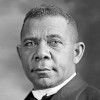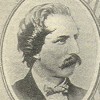COMPROMISE, n. Such an adjustment of conflicting interests as gives each adversary the satisfaction of thinking he has got what he ought not to have, and is deprived of nothing except what was justly his due.
Ambrose Bierce (1842-1914?) American writer and journalist
“Compromise,” The Cynic’s Word Book (1906)
(Source)
Included in The Devil's Dictionary (1911). Originally published in the "Devil's Dictionary" column in the San Francisco Wasp (1881-08-12).
Quotations about:
advantage
Note not all quotations have been tagged, so Search may find additional quotes on this topic.
If you have the privilege of a fine education, well, you have it because somebody made it possible. If you have the privilege to gain wealth and a bit of the world’s goods, well, you have it because somebody made it possible. So don’t boast, don’t be arrogant.
Martin Luther King, Jr. (1929-1968) American clergyman, civil rights leader, social activist, preacher
“Conquering Self-Centeredness,” sermon, Dexter Ave. Baptist Church, Montgomery (11 Aug 1957)
(Source)
It is those who are successful, in other words, who are most likely to be given the kinds of special opportunities that lead to further success. It’s the rich who get the biggest tax breaks. It’s the best students who get the best teaching and most attention. And it’s the biggest nine- and ten-year-olds who get the most coaching and practice. Success is the result of what sociologists like to call “accumulative advantage.”
Malcolm Gladwell (b. 1963) Anglo-Canadian journalist, author, public speaker
Outliers: The Story of Success, ch. 1 “The Matthew Effect,” sec. 5 (2008)
(Source)
In any country, regardless of what its laws say, wherever people act upon the idea that the disadvantage of one man is the good of another, there slavery exists. Wherever, in any country the whole people feel that the happiness of all is dependent upon the happiness of the weakest, there freedom exists.
Booker T. Washington (1856-1915) American educator, writer
Speech, Republican Club, New York City (12 Feb 1909)
(Source)
For tho’ it is certainly more laudable, and a thing of greater moment, to be generous, constant, and magnanimous, than merely to be polite and well bred; yet we find, from daily experience, that sweetness of manners, a genteel carriage, and, polite address are frequently of more advantage to those who are so happy as to be possessed of them, than any greatness of soul or brightness of parts are to those who are adorned with those more shining talents.
[E come che l’esser liberale o constante o magnanimo sia per sé sanza alcun fallo più laudabil cosa e maggiore che non è l’essere avenente e costumato, non di meno forse che la dolcezza de’ costumi e la convenevolezza de’ modi e delle maniere e delle parole giovano non meno a’ possessori di esse che la grandezza dell’animo e la sicurezza altresì a’ loro possessori non fanno.]
Giovanni della Casa (1503-1556) Florentine poet, author, diplomat, bishop
Galateo: Or, A Treatise on Politeness and Delicacy of Manners [Il Galateo overo de’ costumi], ch. 1 (1558) [tr. Graves (1774)]
(Source)
(Source (Italian)). Alternate translations:
And albeit Liberalitie, or magnanimitie, of themselves beare a greater praise, then, to be a well taught or manored man: yet perchaunce, the courteous behaviour and entertainement with good maners and words, helpe no lesse, him that hath them: then the high minde and courage, advaunceth him in whome they be.
[tr. Peterson (1576)]
Although liberality, courage, or generosity are without doubt far greater and more praiseworthy things than charm and manners, none the less, pleasant habits and decorous manners and words are perhaps no less useful to those who have them than a noble spirit and self-assurance are to others.
[tr. Einsenbichler/Bartlett (1986)]
But if I am to die before my time, I count that a gain. When anyone lives as I do, surrounded by evils, how can he not carry off gain by dying?
[εἰ δὲ τοῦ χρόνου
πρόσθεν θανοῦμαι, κέρδος αὔτ᾽ ἐγὼ λέγω.
ὅστις γὰρ ἐν πολλοῖσιν ὡς ἐγὼ κακοῖς
ζῇ, πῶς ὅδ᾽ Οὐχὶ κατθανὼν κέρδος φέρει]Sophocles (496-406 BC) Greek tragic playwright
Antigone, l. 460 ff [Antigone] (441 BC) [tr. Jebb (1891)]
(Source)
Alt. trans.:
But if I am to die before my time, I count that a gain: for when any one lives, as I do, compassed about with evils, can such an one find aught but gain in death?
[tr. Jebb (1917)]
And if my time is shortened, this to me
Is gain indeed. For whoso lives, as I live,
Beset with many sorrows, how does he
Not win by dying?
[tr. Donaldson (1848)]
If death
Is thereby hastened, I shall count it gain
For death is gain to him whose life, like mine,
Is full of misery.
[tr. Storr (1859)]
And now, if I fall
A little sooner, 'tis the thing I wish.
To thou, who live in misery like me,
Believe me, King, 'tis happiness to die.
[tr. Werner (1892)]
But if I die young, all the better:
People who live in misery like mine
Are better dead.
[tr. Woodruff (2001)]
I knew that my death was imminent, of course I did, and even if it came sooner, I would still think it a good thing because when one lives in such a dreadful misery why should he not think death to be a good thing?
[tr. Theodoridis (2004)]
And if I have to die
before my time, well, I count that a gain.
When someone has to live the way I do,
surrounded by so many evil things,
how can she fail to find a benefit
in death?
[tr. Johnston (2005), l. 521ff]
If I die
before my time, I say it is a gain.
Who lives in sorrows many as are mine
how shall he not be glad to gain his death?
[tr. Wyckoff]
But if
I shall die before my time, I declare it a profit,
for whoever lives beset, as I do, by many things evil,
how does he not gain profit by dying?
[tr. Tyrrell/Bennett]
Let none of us delude himself by supposing that honesty is always the best policy. It is not.
William Ralph Inge (1860-1954) English prelate [Dean Inge]
Speculum Animae, Part 2, “Sunday Morning,” address, Cambridge (15 Jan 1911)
(Source)
Inge's argument is not that honesty is not the most virtuous course, but that it is not always the most secularly advantageous course, and that such disadvantage is one of the costs of maintaining Christian virtue.
It is easy to be brave from a safe distance.
DUKE SENIOR: Sweet are the uses of adversity,
Which, like the toad, ugly and venomous,
Wears yet a precious jewel in his head.William Shakespeare (1564-1616) English dramatist and poet
As You Like It, Act 2, sc. 1, l. 12ff (2.1.12-14) (1599)
(Source)
I love to see two truths at the same time. Every good comparison gives the mind this advantage.
[J’aime à voir deux vérités à la fois. Toute bonne comparaison donne à l’esprit cet avantage.]
Joseph Joubert (1754-1824) French moralist, philosopher, essayist, poet
Pensées [Thoughts], Introduction, “L’auteur Peint par Lui-Même [The Author’ Self-Portrait]” (1850 ed.) [tr. Auster (1983)], 1796]
(Source)
(Source (French)). Alternate translations:
I like to see two truths at once. Every good comparison gives the mind this advantage.
[tr. Calvert (1866), "Notice"]
I like to see two truths at once. Every good comparison gives the mind that advantage.
[tr. Collins (1928)]
No occurrences are so unfortunate that the shrewd cannot turn them to some advantage, nor so fortunate that the imprudent cannot turn them to their own disadvantage.
[Il n’y a point d’accidents si malheureux dont les habiles gens ne tirent quelque avantage, ni de si heureux que les imprudents ne puissent tourner à leur préjudice.]François VI, duc de La Rochefoucauld (1613-1680) French epigrammatist, memoirist, noble
Réflexions ou sentences et maximes morales [Reflections; or Sentences and Moral Maxims], ¶59 (1665-1678) [tr. Tancock (1959)]
(Source)
Present in the original 1665 edition. In manuscript, this was originally drafted as:
One could say that there are no lucky or unfortunate accidents, because clever people know how to take advantage of bad ones, and the imprudent very often turn the most advantageous harm to themselves.
[On pourrait dire qu’il n’y a point d’heurcux ni de malheureux accidents, parce que les habiles gens savent profiter des mauvais, et que les imprudents tournent bien souvent à leur préjudice les plus avantageux.]
(Source (French)). Alternate translations:
It may be affirm'd that either there are not any happy or unhappy accidents, or that all accidents are both happy and unhappy, inasmuch as the prudent know how to make their advantages of the bad, and the imprudent many times turn the most advantageous emergencies to their own prejudice.
[tr. Davies (1669), ¶128]
There is no accident so exquisitely unfortunate, but wise Men will make some advantage of it; nor any so entirely fortunate, but Fools may turn it to their own prejudice.
[tr. Stanhope (1694), ¶60]
No accidents are so unlucky, but that the prudent may draw some advantage from them: nor are there any so lucky, but what the imprudent may turn to their prejudice.
[pub. Donaldson (1783), ¶8; [ed. Lepoittevin-Lacroix (1797), ¶58]
No accidents are so unlucky, but what the prudent may draw some advantages from; nor are there any so lucky, but what the imprudent may turn to their prejudice.
[ed. Carville (1835), ¶5]
There are no circumstances, however unfortunate, that clever people do not extract some advantage from; and none, however fortune, that the imprudent cannot turn to their own prejudice.
[ed. Gowens (1851), ¶60]
There are no accidents so unfortunate from which skillful men will not draw some advantage, nor so fortunate that foolish men will not turn them to their hurt.
[tr. Bund/Friswell (1871)]
A clever man reaps some benefit from the worst catastrophe, and a fool can turn even good luck to his disadvantage.
[tr. Heard (1917)]
No event is so disastrous that the adroit cannot derive some benefit from it, nor so auspicious that fools cannot turn it to their detriment.
[tr. Stevens (1939)]
There is no accident so disastrous that a clever man cannot derive some profit from it: nor any so fortunate that a fool cannot turn it to his disadvantage.
[tr. FitzGibbon (1957)]
There are no experiences so disastrous that thoughtful men cannot derive some profit from them, nor so happy that the thoughtless cannot use them to their harm.
[tr. Kronenberger (1959)]
There are no accidents so unfortunate that clever men may not draw some advantage from them, nor so fortunate that imprudent men may not turn them to their own detriment.
[tr. Whichello (2016)]
The chief difference between free capitalism and State socialism seems to be this: that under the former a man pursues his own advantage openly, frankly, and honestly, whereas under the latter he does so hypocritically and under false pretences.
A wise man gets more use from his enemies than a fool from his friends.
[Al varón sabio más le aprovechan sus enemigos que al necio sus amigos.]
Baltasar Gracián y Morales (1601-1658) Spanish Jesuit priest, writer, philosopher
The Art of Worldly Wisdom [Oráculo Manual y Arte de Prudencia], § 84 (1647) [tr. Jacobs (1892)]
(Source)
See also Aristophanes. (Source (Spanish)). Alternate translations:
The wise man draws more advantage from his Enemies, than the fool does from his Friends.
[Flesher ed. (1685)]
To a wise man, his enemies avail him more, than to a fool, his friends.
[tr. Fischer (1937)]
The wise person finds enemies more useful than the fool finds friends.
[tr. Maurer (1992)]
“Thrice is he armed that hath his quarrel just” —
And four times he who gets his fist in fust.Artemus Ward (1834-1867) American humorist, editor, lecturer [pseud. of Charles Farrar Browne]
Shakespeare Up-to-Date
See Shakespeare. Also attributed to Josh Billings in Josh Billings: His Sayings (1865), and sometimes oddly credited to Romans 13:7.
And while I at length debate and beate the bush,
There shall steppe in other men and catch the burdes.John Heywood (1497?-1580?) English playwright and epigrammist
Proverbes, Part 1, ch. 3 (1546)
(Source)



















